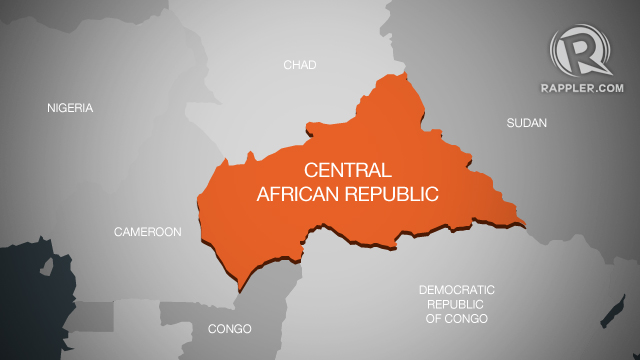SUMMARY
This is AI generated summarization, which may have errors. For context, always refer to the full article.

BANGUI, Central African Republic – The Central African Republic began the search for a peacemaker president Tuesday, after months of traumatic conflict characterized by unprecedented religious violence that displaced hundreds of thousands.
A special session of parliament convened to elect a new interim leader for the poor landlocked country of 4.6 million people, where a terrifying spiral of atrocities pitted Muslims against the Christian majority.
Rebel-leader-turned-president Michel Djotodia resigned last week under international pressure.
As the 135 members of the transitional ruling body (CNT) began their deliberations, police patrolled the streets of the capital Bangui for the first time in weeks, after 100,000 residents fled the city.
Monday night had been quiet with no reports of fresh looting, which had raged across Bangui while Christian militias fought Muslim former rebels, residents told the Agence France-Presse.
Almost 150 staff at one of the main hospitals in town, the Hopital de l’Amitie, returned to work after fleeing at the height of clashes early in December, Save the Children said Tuesday. The returnees represented nearly half of the personnel.
More than 500 patients have already been admitted this week, with the premises under the guard of Burundian soldiers from an African peacekeeping force known as MISCA, the charity said in a statement.
“The hospital is in a very populous part of the town, where many people have been displaced. The healthcare needs are enormous here,” hospital director Abdulkarim Zakaria said.
Save The Children director for the CAR Robert Lankenau said that the establishment could now deal with “people who really need our help, from young children with malaria to mothers in need of urgent caesarian operations,” but he lamented a lack of medicines.
Despite positive signs, few of the displaced scores of thousands who had fled to a sprawling, overcrowded tent city by Bangui’s airport – where 3,500 MISCA soldiers and 1,600 French troops are based – were willing to risk going home.
There was “no large-scale return,” a representative of medical charity Doctors without Borders (MSF). “People remain very cautious. They are aware that the situation is still volatile.”
‘Gross human rights violations’
Current interim leader Alexandre-Ferdinand Nguendet, the speaker of parliament, had Monday urged fearful people to return home once the violence abated after Djotodia stepped down on Friday.
Opening the CNT session, Koyassoum Doumta, the body’s vice-president, urged his colleagues to elect “someone who represents peace, national reconciliation and who will supervise future elections in a spirit of transparency.”
Djotodia, the first Muslim to lead the mainly Christian country, resigned at a summit of his regional peers after failing to halt the inter-religious violence in the wake of a March coup that ousted president Francois Bozize.
He proved unable to control his mainly Muslim Seleka rebels who went on a spree of looting, killing and raping, sparking revenge attacks from Christian militias set up to defend against them.
In the wake of Djotodia’s resignation, there have been scenes of reconciliation between former enemies in some areas and deserting police and soldiers have begun to return to duty in their hundreds.
According to political sources, there are likely to be 10 or so candidates to fill the void left by Djotodia, including Nguendet.
However, whoever is elected interim president will not be able to stand for elections due to be held no later than the first half of 2015.
Ten months of violence have displaced a fifth of the country’s population and the inter-religious flare-up has killed more than 1,000 people in the past month alone, despite foreign military intervention.
On Monday, Nguendet vowed that the “anarchy” that has wracked the CAR would be swiftly brought to an end and he sternly admonished militiamen from the Seleka and the so-called “anti-balaka” Christian fighters set up to oppose them.
“To the ex-Seleka, to the anti-balaka and the lovers of looting, I’m giving you a severe warning: The party is over,” he said at a police headquarters in Bangui.
The United Nations special envoy to the CAR, Babacar Gaye, sounded a cautious note, warning that “hate is still there” between members of the religious communities, which had hitherto lived peacefully together through previous upheavals.
After both sides turned to slaughter, rape, mutilation and vengeance, UN investigators in the CAR found evidence of “widespread lawlessness and gross human rights violations”, UN High Commissioner for Human Rights Navi Pillay said Tuesday.
“The situation remains extremely volatile and dangerous,” she warned in a statement based on findings to be presented to a special session of the UN Human Rights Council next Monday. – Rappler.com
Add a comment
How does this make you feel?




![[Two Pronged] My daughter wants to go to UP, but my husband insists on a ‘good Catholic school’](https://www.rappler.com/tachyon/2024/02/two-pronged-university-issue.jpg?resize=257%2C257&crop=375px%2C0px%2C1080px%2C1080px)
There are no comments yet. Add your comment to start the conversation.